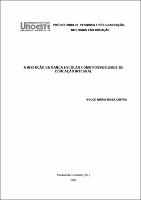| Compartilhamento |


|
Use este identificador para citar ou linkar para este item:
http://bdtd.unoeste.br:8080/jspui/handle/tede/922| Tipo do documento: | Dissertação |
| Título: | A inserção da dança escolar como possibilidade de educação integral |
| Título(s) alternativo(s): | The inserted of the school dance how a possibility of integral education |
| Autor: | Cintra, Dulce Maria Rosa  |
| Primeiro orientador: | Moretti, Lucia Helena Tiosso |
| Primeiro membro da banca: | Cardoso, Sônia Maria Vicente |
| Segundo membro da banca: | Freitas Júnior, Ismael Forte |
| Resumo: | Esta pesquisa aborda a dança como possibilidade de educação integral, visto que ela está inserida no contexto escolar como um instrumento lúdico - conduzindo e mediando ações entre professor/aluno e este meio da expressividade humana contribui beneficamente para estimular o aprendizado geral da criança, despertando-lhe a curiosidade pelo saber, que aparece de forma prazerosa e motivadora. Os objetivos do estudo foram relacionar os temas da dança com os conteúdos desenvolvidos em sala de aula, analisar, junto à professora, os benefícios da dança no desenvolvimento global da criança, e examinar a formação do professor de educação física na educação infantil. Trata-se de uma pesquisa descritiva, qualitativa, inserida na metodologia de pesquisa-ação, assentada nos pressupostos de Rudolf Laban e Lê Bouch e outros estudiosos do tema em questão. Compuseram a amostra 20 crianças, sendo 10 meninos e 10 meninas, com idade de 6 anos, matriculadas no Pré-III. O estudo foi realizado na Casa da Criança e Centro Social São José da cidade de Presidente Prudente (SP). As atividades foram desenvolvidas no pátio da escola. Foram utilizados nas aulas, lenços, bolas, bambolês e pinturas de amarelinha no chão, como recurso espacial e limites. Além disso, foram selecionadas músicas de MPB, folclóricas, cantigas de roda e parlendas para estimular a linguagem falada e a acuidade auditiva e desenvolver o pensamento lógico matemático pelas brincadeiras rítmicas e jogos calmantes que trabalham a inteligência cinestésica corporal. Foi aplicado um questionário à professora das crianças com objetivo de investigar a performance dos alunos após as atividades desenvolvidas, bem como preencher uma ficha de observação de cada criança. Todos os dados foram analisados qualitativamente e os resultados apontaram a emergência de entendermos num contexto holístico, pessoas, enquanto formadores do pensamento, e que estas, farão uso de sua cidadania como profissionais responsáveis por sua sabedoria prática sob influência direta do feedback escolar. Constatamos que as crianças de modo geral obtiveram um relevante e significativo empenho nos itens socialização, cooperação, disciplina e percepção auditiva |
| Abstract: | This research approaches the dance as possibility of integral education, considering it is inserted in the school context as an instrument of recreation - leading and mediating actions between teacher/student and this middle of the human expressiveness contributes positively to stimulate the child's general learning, waking up him/her the curiosity for the knowledge, that appears in a pleased and motivating form. The objectives of the study were: to relate the themes related to dance with the contents developed in the class room; to analyze, close to the teacher, the benefits of the dance in the child's global development; and to examine the physical education teacher's formation in the infant education. It is a descriptive and qualitative research, inserted in the research-action methodology, seated in Rudolf Laban's, Le Boulch, and other specialists presuppositions of the theme in subject. The sample was composed by 20 children, being 10 boys and 10 girls, with 6 year-old age, enrolled in Pré-III. The study was accomplished in the Child's House and Social Center São José of the city of Presidente Prudente (SP). The activities were developed at the patio of the school. They were used in the classes, handkerchiefs, balls, hula hoops and " paintings in the ground , as space resource and limit. Besides, music of BPM (Brazilian popular music) were selected, folkloric, music for children and rhythmics poems, to stimulate the spoken language and the auditory sharpness and to develop the mathematical logical thought for the rhythmic games and soothing games that work the kinestesic body intelligence. It was applied a questionnaire to the children's teacher with objective of investigating the students' performance after the developed activities, as well as to fill out a record of each child's observation. All the data were analyzed qualitatively and the results pointed the emergency of we understand in a holistic context, people, while builders of the thought, and that these, will make use of your citizenship as responsible professionals for your practical wisdom under direct influence of the school feedback". We verified that the children in general obtained an important and significant pledge in the items socialization, cooperation, followed by discipline and auditory perception. |
| Palavras-chave: | dança na educação aprendizagem formação de professor educação integral dance education teacher training integral education Learning |
| Área(s) do CNPq: | CNPQ::CIENCIAS HUMANAS::EDUCACAO |
| Idioma: | por |
| País: | BR |
| Instituição: | Universidade do Oeste Paulista |
| Sigla da instituição: | UNOESTE |
| Departamento: | Ciências Humanas |
| Programa: | Mestrado em Educação |
| Citação: | CINTRA, Dulce Maria Rosa. The inserted of the school dance how a possibility of integral education. 2007. 107 f. Dissertação (Mestrado em Ciências Humanas) - Universidade do Oeste Paulista, Presidente Prudente, 2007. |
| Tipo de acesso: | Acesso Aberto |
| URI: | http://bdtd.unoeste.br:8080/tede/handle/tede/922 |
| Data de defesa: | 22-Mai-2007 |
| Aparece nas coleções: | Mestrado em Educação |
Arquivos associados a este item:
| Arquivo | Descrição | Tamanho | Formato | |
|---|---|---|---|---|
| DULCE_DISSERTACAO.pdf | 2,85 MB | Adobe PDF |  Baixar/Abrir Pré-Visualizar |
Os itens no repositório estão protegidos por copyright, com todos os direitos reservados, salvo quando é indicado o contrário.




